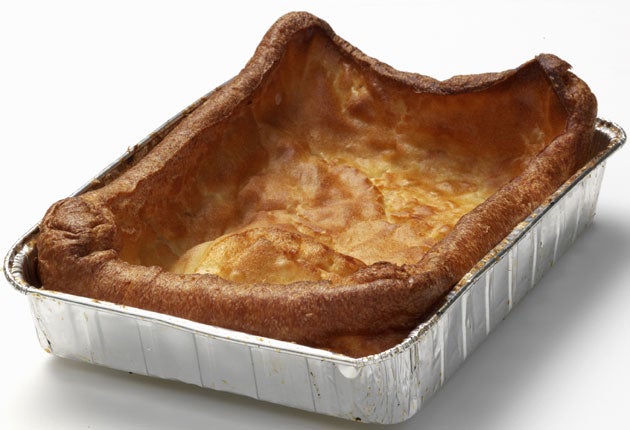Yorkshire TM: The Champagne of puddings
Foodies want to give our Sunday roast favourite the same status as Parma ham and the French bubbly

Your support helps us to tell the story
From reproductive rights to climate change to Big Tech, The Independent is on the ground when the story is developing. Whether it's investigating the financials of Elon Musk's pro-Trump PAC or producing our latest documentary, 'The A Word', which shines a light on the American women fighting for reproductive rights, we know how important it is to parse out the facts from the messaging.
At such a critical moment in US history, we need reporters on the ground. Your donation allows us to keep sending journalists to speak to both sides of the story.
The Independent is trusted by Americans across the entire political spectrum. And unlike many other quality news outlets, we choose not to lock Americans out of our reporting and analysis with paywalls. We believe quality journalism should be available to everyone, paid for by those who can afford it.
Your support makes all the difference.Plans to elevate the much loved Yorkshire pudding to the same culinary status as Champagne and Parma ham could spell disaster for the long-standing partnership between the baked batter treats and traditional roast beef.
A local food group wants Yorkshire puddings to apply for the same protected food status held by delicacies such as Parmesan and Whitstable oysters, which, if it succeeds, could stop anyone outside the county calling their batter puddings Yorkshires.
Until now, the major stumbling block to seeking Protected Designation of Origin status for Yorkshire puddings was that the name has become generic. But the Regional Food Group for Yorkshire and Humber believes a centuries-old recipe holds the key to proving otherwise, and that the "Yorkshire" appendage is no accident.
Sarah Knapper, the body's research and development director, said Leeds library records show that the 18th-century food writer Hannah Glasse coined the term Yorkshire pudding in her book Art of Cookery Made Plain and Easy, renaming the old and flatter dripping pudding, which had been cooked in England for centuries. "This establishes a link with a recipe called Yorkshire pudding, which was around at that time and suggests it is originally from Yorkshire," Ms Knapper said. Today, three Yorkshire-based firms make ready-made versions, which have soared in popularity since hitting the shelves in 1995.
Ms Knapper said the next step to seeking legal protection under a European Commission scheme is for the three makers to lodge an application. Paul Holmes of the Real Yorkshire Pudding Company said he "would be very interested", and had discussed applying with Aunt Bessie's, his rival. The other firm is the Irish Greencore, which has a local frozen-food factory.
Increasingly, food producers worldwide are seeking protected culinary status. Just last month, Yorkshire forced rhubarb became the latest British product to join the European food club. Yet it was only the 41st to do so, compared with more than 300 delicacies from France and Italy. The Department for Environment, Food and Rural Affairs is trying to redress the balance with an initiative to raise awareness of Britain's best speciality producers.
About 40 more products are in the process of applying for a protected food name stamp, including Jersey butter and Cumberland sausage. Another is the Cornish pasty, which again had been dismissed as too generic to succeed.
Owen Warnock, a partner at the law firm Eversheds and an expert on food labelling, said success for the Cornish pasty could be crucial to a bid by the Yorkshire pudding. But he added: "It would be difficult to persuade the European authorities that the characteristics and reputation of pre-made Yorkshire puddings depend on them being made in Yorkshire."
Not all protected products have long histories. Ms Knapper pointed out that Swaledale cheese, another Yorkshire product, dates back to the late 1980s.
A success for Yorkshire pudding would not stop home cooks from whipping up batter with a roast, but the position for Sunday carveries is less clear. Mr Warnock said it would be a "potential hurdle" if an application stopped a Somerset restaurateur from using the words "Yorkshire pudding" on a menu.
Nigella's Yorkshire pudding
11/4 cups milk; 4 eggs; scant 1/2 tsp salt; freshly ground black pepper; 11/2 cups all-purpose flour, sifted; 1 tbs beef dripping or vegetable oil
Preheat oven to 450F. Mix milk, eggs, & salt; add pepper, beating together with an electric mixer or balloon whisk. Let these ingredients stand for 15 mins, then whisk in flour. Meanwhile, add dripping to large heat-proof pan and put it in oven for about 10 mins. Pour the batter into this intensely hot pan, and cook for 20 mins, or until well puffed and golden.
Join our commenting forum
Join thought-provoking conversations, follow other Independent readers and see their replies
Comments